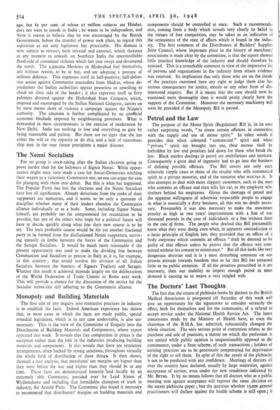Petrol and the Law
The purpose of the Motor Spirit (Regulation) Bill is, in its own rather surprising words, "to create certain offences in connection with the supply and use of motor spirit." In other words it provides that when coloured " commercial " spirit and white " private " spirit are brought into use, their misuse shall be forbidden by law and penalties laid down for those who break the law. Black market dealings in petrol are multifarious and intricate. Consequently a great deal of ingenuity had to go into the business of defining possible offences. The Bill covers not only such relatively simple cases as those of the retailer who sells commercial spirit to a private motorist, and of the motorist who receives it. It also attempts to deal with more slippery customers, such as the man who commits an offence and then sells his car, or the employer who shelters behind his employees. Given the shortage of petrol and the apparent willingness of otherwise respectable people to engage in what is essentially a dirty business, all this was no doubt neces- sary. Presumably it was also necessary to make the maximum penalty as high as two years' imprisonment with a fine of one thousand pounds in the case of individuals, or a fine without limit in the case of firms. The people who drafted this Bill presumably knew what they were doing even when, in apparent contradiction of a basic principle of English law, they provided that an officer of a body corporate which commits an offence "shall be deemed to be guilty of that offence unless he proves that the offence was com- mitted without his consent'or connivance." But all this looks like very dangerous doctrine and it is a most disturbing comment on our present attitude towards freedom that so far this Bill has attracted little or no public attention. If all the penalties prescribed in it are necessary, then our inability to import enough petrol to meet demand is causing us to weave a very tangled web.






























 Previous page
Previous page